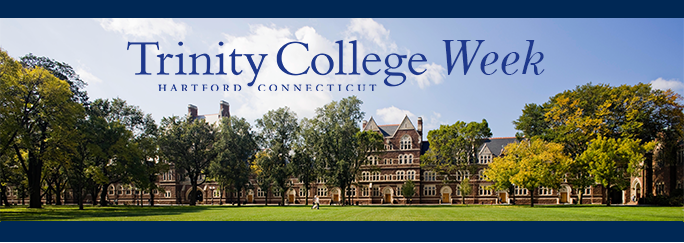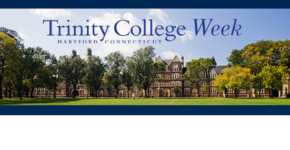
The Academic Minute from 03.11 – 03.15
Monday, March 11th
Elizabeth Casserly – Trinity College
Vision and Communication
Elizabeth Casserly began her study of human language and cognition as an undergraduate Linguistics major at Yale University. Since then, she has volunteered as a research assistant for a speech-oriented group of electrical engineers at MIT, worked as a lab manager and researcher on language acquisition for Harvard’s Laboratory for Developmental Studies, and studied speech perception and hearing loss at Indiana University, earning her MA in Linguistics and a joint PhD in Cognitive Psychology and Linguistics.
Tuesday, March 12th
William Church – Trinity College
Cell Death and Parkinson’s Disease
Professor Church grew up in Virginia and received a B.S. in Chemistry at James Madison University. After taking a year off to work in a hospital where he realized that studying the chemical causes of psychoactive drug side effects would be much more interesting than studying medicine, he obtained his Ph.D. in Analytical Chemistry at Emory University in Atlanta GA. It was here that he was able to form a happy marriage between his two favorite science interests: analytical instrumentation and neuroscience. Having never been west of the Mississippi, he accepted a postdoctoral appointment at the Salk Institute in La Jolla, Calif. working in the Clayton Foundation Peptide Biology Lab for Wiley Vale. He initially came to Trinity in 1988 as a Visiting Professor in the Chemistry Department and was fortunate to be able to return to Trinity in 1995 in a joint appointment in the Chemistry Department and the Neuroscience Program. He serves on the Health Professions Advising Committee, the IACUC, and is the faculty liaison for both the Women’s Soccer team and the Softball team.
Wednesday, March 13th
Sarah Raskin – Trinity College
Prospective Memory
Professor Sarah Raskin graduated from Johns Hopkins in 1984 with a B.A. in Behavioral Biology and from the City University of New York Graduate Center in 1990 with a Ph.D. in Neuropsychology. She held a clinical appointment in the Department of Rehabilitation Medicine at Mount Sinai Medical Center in New York City from 1988-1991. She held a clinical appointment at Good Samaritan Neuropsychological Services and an academic appointment in the Department of Psychosocial Nursing at the University of Washington from 1991-1994. She has been a member of the faculty at Trinity College since 1994. She was board certified in Clinical Neuropsychology by the American Board of Professional Psychology in 1997.
Thursday, March 14th
Dan Lloyd – Trinity College
Music as The Language of the Brain
Dan Lloyd wonders how our gray and squishy brains could be the location of the symphonic kaleidoscope of human consciousness. For centuries this question was the province of philosophy, but now philosophy has teamed up with neuroscience, with revolutionary results. An explosion of research on the brain is bringing us closer to knowing what’s really going on, in the neurons, when we spot a familiar face, feel happy or hungry, add numbers in our head, or engage in thousands of other tasks that flow together in our moment-to-moment experience of the world and ourselves. It’s a grand, ultimate mystery and Lloyd’s students confront it as colleagues with their professor. A Lloydian classroom is intensely interdisciplinary, where a discussion of what it’s like to taste a jalapeno pepper is followed by a lab where students analyze and question brain scan data. In many cases, the brains and minds students study are their own; through an affiliation with the nearby Olin Neuropsychiatric Research Center, students volunteer as healthy control subjects in functional MRI experiments, and frequently go on to pursue independent research in brain imaging as part of an undergraduate major in Neuroscience, Psychology, or even Philosophy.
Friday, March 15th
Susan Masino – Trinity College
Ketogenic Diet
Dr. Masino is the Vernon Roosa Professor of Applied Science at Trinity College and a joint appointment in Neuroscience and Psychology. Her research focuses on promoting and restoring brain health, with a particular interest in adenosine, and on the relationship among metabolism, brain activity and behavior. For nearly 100 years a metabolic therapy called a “ketogenic diet” has been used to treat seizures, and recent mechanistic insights – including the role of adenosine – hold translational implications for brain health and diverse disorders.
In addition to her laboratory research Dr. Masino is interested in how public polices can improve brain health – with a special focus on New England’s amazing forests – and involved in local educational and environmental issues.

